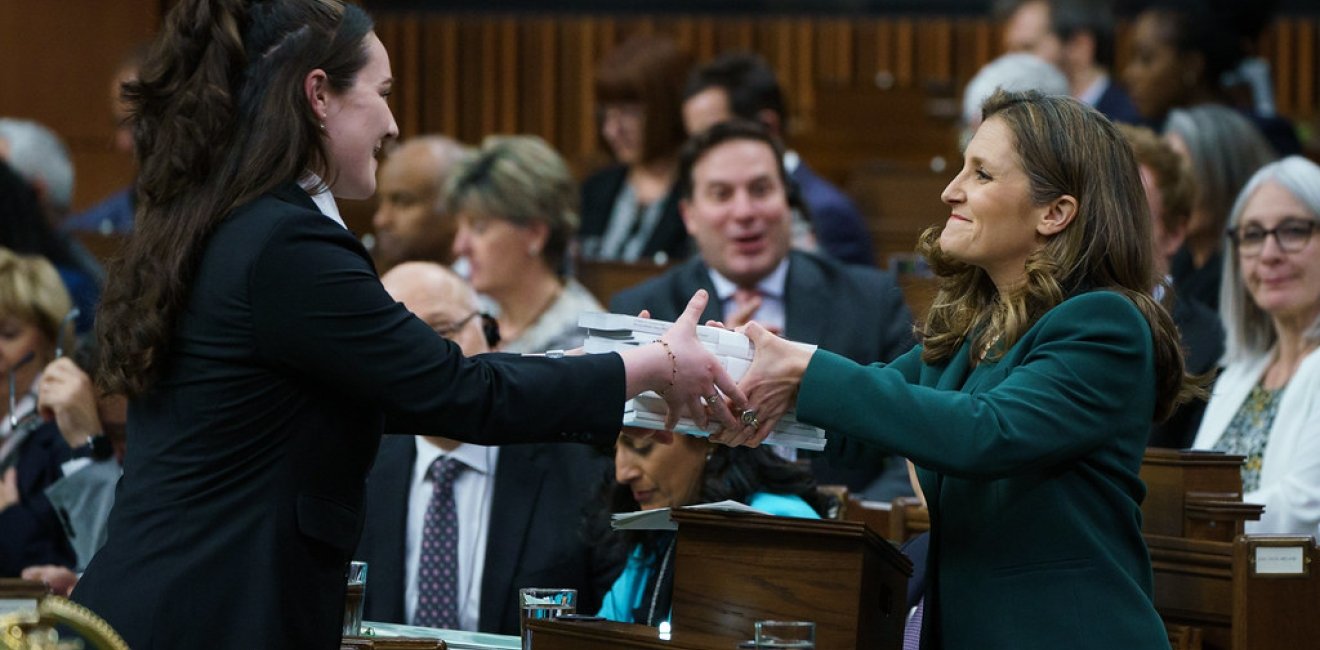Canada’s Fiscal Laryngitis on the World Stage
Canada Institute Director Christopher Sands reacts to the 2024 Canadian federal budget and calls for Ottawa to not lose sight of foreign priorities.
Canada Institute Director Christopher Sands reacts to the 2024 Canadian federal budget and calls for Ottawa to not lose sight of foreign priorities.

There has already been ample commentary on the 2024 Canadian federal budget that was released on April 16. This is a modest addition from a foreign observer’s perspective to call attention to a very unfortunate trend of underfunding of Canada’s international engagement.
No government drafts a budget to please foreigners (unless they are in debt to foreign creditors, perhaps). Budgets are sensibly focused on domestic priorities. This is particularly true in democracies like Canada and the United States where taxpayers are also voters, therefore doubly important to the nation’s finances and policies.
For the United States, the headline number from the Canadian budget was 1.76 percent. That is the percentage of gross domestic product (GDP) that Canada will spend on defense by 2030, glaringly short of the Trudeau government’s North Atlantic Treaty Organization (NATO) Wales summit commitment to reach 2 percent by 2024, which at the NATO Vilnius summit in 2023 was established as a floor for spending, not merely an aspirational goal. Canada endorsed this in the summit final communique.
It is notable that the future target of 1.76 percent of GDP spent on defense by 2030 includes $1.6 billion CAD (~$1.17 billion USD) for military assistance to Ukraine over five years. The US Congress struggled to pass a $60 billion USD military assistance package in recent weeks.
The new budget continues annual increases for Global Affairs Canada, enabling the department to continue to rebuild after years of budget cuts. A 2023 Canadian Senate report called for a major reinvestment in Canada’s foreign service, and the 2024 budget includes $159 million CAD in response (~$116 million USD).
Yet even with this new money, Global Affairs plans cuts to funding for the International Assistance Innovation Program and Sovereign Loans Program, and end funding for Canada’s Middle East Strategy as of April 2025 (despite the ongoing crisis in the region). They will “recalibrate” marketing efforts to attract international students to Canada’s world class universities, which means reductions in outlays if not in outreach.
The 2024 budget increases spending on official development assistance, but even so Canada’s 2023 spending level was, according to the Organization for Economic Cooperation and Development, just .38 percent of gross national income (GNI), a little more than half the target of 0.7 set by former Liberal Prime Minister Lester Pearson.
Within that limited amount of aid, Canada is making strategic investments: providing $16 million CAD (~$11.7 million USD) for a global fund to address loss and damage due to climate change, adding $1.3 billion (~$950 million USD) in Special Drawing Rights to an International Monetary Fund Poverty Reduction and Growth Trust, and $400 million CAD (~$292 million USD) in humanitarian and security assistance to Haiti. These investments have added impact because they are part of multilateral efforts, and Canadian taxpayers’ funds attract investments from other countries.
There is a lot of good news in budget 2024 for Canada’s international engagement, and the country’s public service program managers deserve credit for making the most of the funds they have. But Canada is working to rebuild a military, diplomatic corps, and international assistance programs that fall short not only of foreign expectations but of foreign hopes as well.
The late US Senator John McCain, who I worked for at the International Republican Institute whose board he chaired, often opened meetings with a blunt call to action: “The world is on fire. What are we going to do about it?”
McCain’s admonition captures the urgency in many capitals as threats to the present world order multiply from Russia, China, Iran, Venezuela, and North Korea. Climate change, pandemics, and resource scarcity challenge the current capacity of many countries to respond.
It is a wildfire world and Canada can do something about it.
Canada has economic and technical contributions to make. Canada can work to build consensus among friendly countries to forging collective security responses and building consensus around action. As an example, after China released two Canadians arrested to punish Canada for honoring a US arrest warrant for a Chinese citizen, Canada spoke out against hostage diplomacy by countries as a negotiating tactic. This international witness led to an Initiative Against Arbitrary Detention in State-to-State Relations that has attracted more than 75 signatory countries. If you doubt the impact of such efforts, listen to US Secretary of State Antony Blinken praising Canada for its leadership on this initiative when he spoke at the Wilson Center earlier this year.
It makes a difference when Canada speaks out. But underfunding of international engagement for decades has meant Canada’s voice has been suffering from a kind of fiscal laryngitis abroad.
Canadians rightly point to domestic priorities, from housing affordability to crumbling infrastructure, over foreign affairs spending. Canada’s individual and business tax rates are high relative to those in the United States, a value added tax applies on most consumer and business spending, and Canada’s national carbon pricing system is another factor boosting prices across the Canadian economy. The 2024 budget increases many tax rates and includes a new levy on capital gains.
It takes a lot of gall to complain that Canada is not spending enough on foreign priorities when domestic needs are great. But I raise the need for Canada to invest in international engagement out of admiration for Canada’s many past contributions, and out of a real concern about the state of the world today. We need Canada’s voice on the world stage to be loud and clear. Budget 2024 raises the volume of that voice.
Budget 2024 raises the volume of that voice, but slowly and incrementally. More of McCain’s urgency is required since Canada is rebuilding, and global crises will not wait until Canada is ready.
Louder faster please.


The mission of the Wilson Center's Canada Institute is to raise the level of knowledge of Canada in the United States, particularly within the Washington, DC policy community. Research projects, initiatives, podcasts, and publications cover contemporary Canada, US-Canadian relations, North American political economy, and Canada's global role as it intersects with US national interests. Read more



